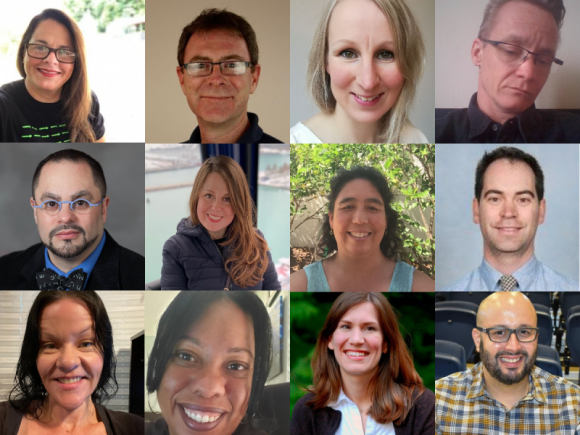In late 2020, the ABE Program Office launched a pilot of the ABE Master Teacher Fellowship, an initiative that provides opportunity, support, and appreciation to exceptional ABE teachers. Over the past 5 months, ABE’s initial 12 Fellows have worked closely with the Program Office and Amgen staff, who served as curriculum advisors, to develop Fellows’ content expertise. Fellows have explored topics of personal interest and are developing corresponding curriculum projects, which will be available on the ABE website once they are complete.
Below is a short preview of the 12 Fellows’ projects:
-
Declan Cathcart of ABE Ireland is developing a mini course on LabXchange that will focus on real-world tasks, such as growing, identifying, and counting bacteria. He envisions that these resources can be used with or prior to hands-on lab work.
-
Angela Del Torro of ABE Puerto Rico focused on the genetic modification of rice. Through her teaching modules, students will learn the purposes of genetic modification, challenges scientists face with this work, and how traits are modified in the real world. Students will use LabXchange or perform hands-on labs.
-
Amanda Dillingham of ABE Massachusetts created a curriculum that aligns with the ABE equity principles. She aims to provide counter narratives and positive identity development in science for Black students. Her students will develop literacy and research skills, and will critically analyze the socio-political contexts of vaccine development.
-
Aidan Johnson of ABE Australia focused on the history of science and technology and how discoveries in one area make others possible. His curriculum focuses on the Human Genome Project and on CRISPR as a tool to treat genetic diseases.
-
Paula Mittelberg of ABE The Netherlands focused on the timely question “Why Get Vaccinated against COVID-19?” Her curriculum will provide a historical perspective on vaccines, and students will complete a case study on vaccine types and the body’s reaction to each. Lastly, students will create an explanatory video about the mRNA vaccine.
-
James Otero of ABE Puerto Rico researched the ethical use of genetically modified organisms. He is developing classroom content on LabXchange. He envisions that his resources can be integrated into interdisciplinary curricula.
-
Urlette Reyes of ABE Greater Los Angeles Area focused on the intersection of several timely issues: vaccines, bioethics, and making informed decisions about one’s own health. Her curriculum will break down complex concepts, like the creation of mRNA vaccines.
-
Mark Schaeffer of ABE The Netherlands plans to use virtual reality (VR) and augmented reality (AR) tools in the classroom. His curriculum will expand on the PTC tasting lab (Exploring Precision Medicine) and molecular techniques (Foundations of Biotech) modules. The interactive modules will also feature 3D models and graphics.
-
Tracy Serros of ABE San Francisco focused on the question “Is Race Biological?” She plans for students to extract and examine their own DNA and then compare it with DNA from people around the world. Her curriculum ties in with the ABE program’s equity principles, as students will learn that we are all genetically similar.
-
Jodie Spitze of ABE Washington State created a curriculum that aligns with local biomanufacturing certificate programs. In it, students learn about the production of recombinant human insulin and vaccine production. They examine biomanufacturing regulations, as well as upstream and downstream processes.
-
David Upegui of ABE Rhode Island researched the history of human classification by physical characteristics and the implications of this, such as the creation of a hierarchical system of race. Students examine how other organisms are grouped, the role of genetics, and learn scientific realities.
- Lisa Yoneda of ABE San Diego is developing a curriculum that uses species barcoding as a tool to expand students’ understanding of biodiversity and ecosystems. She sees barcoding as an integration point for ecological studies in biotechnology. Lisa also plans to create a supplemental project on bioinformatics.
READ MORE about the ABE Master Teacher Fellowship and this year’s Fellows!!
